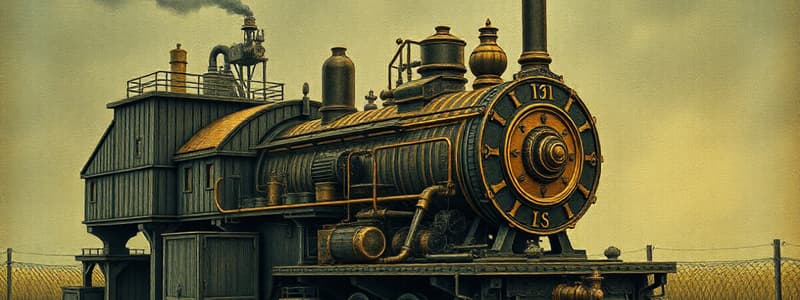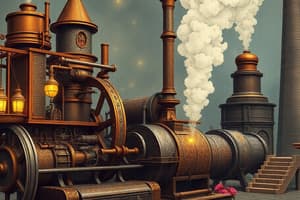Podcast
Questions and Answers
What was a significant outcome of the Agricultural Revolution?
What was a significant outcome of the Agricultural Revolution?
- Reduction in agricultural output
- Decrease in urbanization
- Increased reliance on child labor
- Expansion of the factory system (correct)
Which invention significantly improved the textile industry during the Industrial Revolution?
Which invention significantly improved the textile industry during the Industrial Revolution?
- Cotton gin
- Steam engine
- Mechanical reaper
- Power loom (correct)
Which of the following ideologies advocates for the collective ownership of production?
Which of the following ideologies advocates for the collective ownership of production?
- Socialism (correct)
- Classical liberalism
- Laissez faire
- Utilitarianism
What was a common complaint of the Luddites during the Industrial Revolution?
What was a common complaint of the Luddites during the Industrial Revolution?
Which legislation aimed to improve conditions for child laborers in factories?
Which legislation aimed to improve conditions for child laborers in factories?
Flashcards are hidden until you start studying
Study Notes
Agricultural Revolution
- Increased food production through new farming techniques and tools.
- Enclosure movement: Landowners consolidated small farms into larger ones, forcing many farmers to seek work in cities.
- This shift in labor contributed to the growth of industries.
Cottage Industry
- Prior to factories, goods were produced in homes or small workshops.
- Workers owned their tools and worked at their own pace.
- This system was gradually replaced by the factory system.
Coal and Iron
- Became essential for industrial production.
- Coal provided fuel for steam engines and iron was used in machinery and infrastructure.
- The discovery and use of these resources significantly impacted industrial expansion.
Steam Engine
- Invented by James Watt in the late 18th century.
- Powered factories, ships, and trains.
- Revolutionized transportation and manufacturing.
Cotton Gin
- Invented by Eli Whitney in 1793.
- Mechanized the process of separating cotton fibers from seeds.
- Increased cotton production and boosted the textile industry.
Power Loom
- Mechanized weaving, accelerating textile production.
- Increased demand for cotton and contributed to the growth of the cotton industry.
- Led to the establishment of textile factories.
Factory System
- Replaced the cottage industry.
- Large-scale production of goods in centralized factories.
- Workers specialized in specific tasks and used machinery.
- This system increased productivity but also had significant social and economic consequences.
Railroads
- Revolutionized transportation.
- Allowed for faster and more efficient movement of goods and people.
- Connected cities and facilitated trade, expanding markets.
Child Labor
- Widely used in factories during the Industrial Revolution.
- Children worked long hours in dangerous conditions for low wages.
- Public outcry and legislation eventually addressed these issues.
Urbanization and Tenements
- Cities grew rapidly as people migrated from rural areas for work.
- Overcrowded and unsanitary living conditions in tenements led to disease outbreaks.
- Urban problems such as crime and poverty became increasingly prevalent.
Cholera
- A deadly waterborne disease that spread rapidly in crowded urban areas.
- Lack of sanitation and clean water contributed to its spread.
- Public health measures were eventually implemented to combat the disease.
Luddites
- A group of English textile workers who protested against the use of machinery that they believed was displacing their jobs.
- They sabotaged factories and machines, representing a backlash against industrialization.
Factory Act of 1833
- Regulated child labor in Britain.
- Limited working hours for children and mandated education.
- Marked a step towards improving working conditions in factories.
Laissez Faire
- Economic doctrine that promoted free markets and limited government intervention.
- Advocated for minimal government regulation of business and industry.
- This philosophy influenced economic policy during the Industrial Revolution.
Classical Liberalism
- Political ideology emphasizing individual rights, limited government, and free markets.
- Supported the idea of a constitutional monarchy or republic with elected representatives.
- Influenced economic and political reforms during the Industrial Revolution.
Utilitarianism
- Philosophical and ethical theory based on maximizing happiness and minimizing suffering.
- Proposed that actions are morally right if they promote the greatest good for the greatest number of people.
- Influenced social reforms advocating for the well-being of the working class.
Socialism
- Political and economic system that advocates for collective ownership and control of resources and production.
- Believed in a more equitable distribution of wealth and social justice.
- Emerged as a response to the social injustices of industrial capitalism.
Karl Marx
- German philosopher and economist who developed the theory of communism.
- Analyzed the conflict between capitalists and workers in his book "Capital."
- Advocated for a classless society where workers owned the means of production.
Communism/Marxism
- A political and economic ideology that advocates for a stateless, classless society where property is communally owned.
- Based on the ideas of Karl Marx.
- Seeks to abolish private property and create a society based on equality and cooperation.
Bourgeois Capitalists
- The business class, owners of capital and means of production during the Industrial Revolution.
- Exploited the working class for profit, according to Marx.
- They used their wealth and power to influence society and politics.
Proletariat
- The industrial working class, those who sold their labor for wages.
- They were often exploited by capitalists and subjected to poor working conditions.
- According to Marx, they were destined to overthrow the capitalist system.
Trade Unions
- Organizations of workers who collectively bargain for better wages and working conditions.
- Played an important role in improving the lives of workers during the Industrial Revolution.
- Advocated for social reforms and legislation that protected workers' rights.
Honors Section
-
Enclosure: Land consolidation that displaced agricultural workers, forcing them to seek factory jobs.
-
Conjuncture (in Marx): The specific historical and economic conditions that gave rise to Capitalism and the conflict between the Bourgeois and Proletariat.
-
Adam Smith: Economist who advocated for laissez-faire economics and the importance of free markets.
-
Jeremy Bentham: Founder of utilitarianism, arguing for actions that benefit the whole, not just the privileged.
-
Robert Owen: Social reformer who advocated for utopian socialism and better conditions for workers.
-
Titus Salt: Successful textile manufacturer who built a model industrial town for his workers.
-
Middle Class Culture: A new social class, more educated and empowered than the working class, with new values and aspirations.
-
Ideology of Domesticity: A social ideology that placed women in the home, emphasizing their role as wife and mother, and the importance of domesticity.
Studying That Suits You
Use AI to generate personalized quizzes and flashcards to suit your learning preferences.




